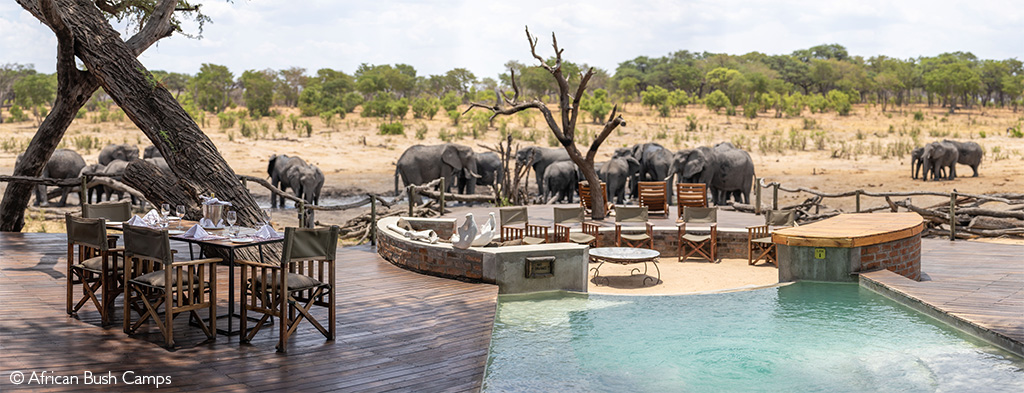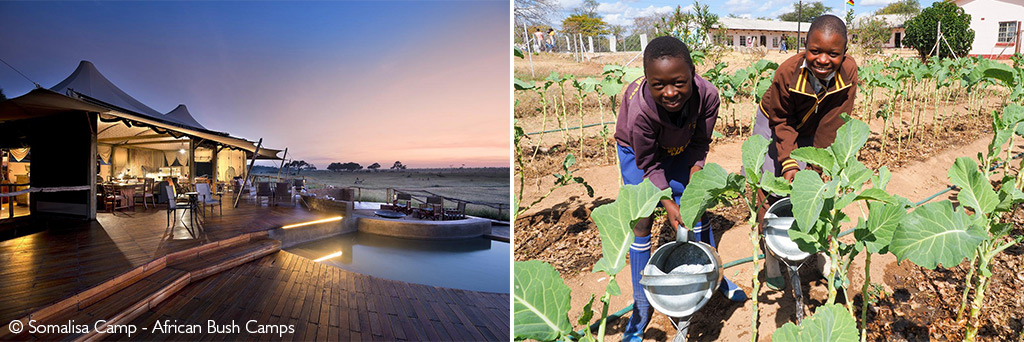
The Covid-19 lockdown of the African tourism industry looks to stay in place for 2020 and part of 2021, and the financial stress will last for years. This translates into a devastating impact on the safari lodge industry and its vast web of beneficiaries.
I spoke to several lodge owners, to better understand the scale of the impact, and to gauge their expectations and plans for the future. These hard-working heroes are at the coalface of the safari industry and of conservation at ground level. My team and I have enjoyed many years of working with them – in our roles in both media and tailored safari planning.
The trickle-down effect of the Covid-19 lockdown is already massive and devastating for many. Those feeling the financial pinch include lodge/camp owners and staff, freelance guides, community-owned tourism attractions, suppliers of consumables and services, and community members who lease their land to lodges and benefit from social projects.
Yes, some African countries may open up their tourism industries for business in the coming months (Tanzania has already done so), but realistically these are political gestures that will have little impact on the arrival of the volumes of international tourists required to fire up the engines of this vital industry. The availability of an effective vaccine aside, other essential industry components are still in a state of flux – such as international flights from core markets, suitable travel insurance and source market outbound travel bans. These components will come to the party in time, of that I have no doubt, but probably not in time to prevent the economic blood-letting that is on the go and set to continue.

Q&A:
![]() Please illustrate the impact of the COVID-19 lockdown on your staff and your local community projects.
Please illustrate the impact of the COVID-19 lockdown on your staff and your local community projects.
Juliet Shenton of Kaingo and Mwamba Camps, South Luangwa, Zambia:
“Both of our camps are seasonal – only operating for the months of May to October, when the annual floods have subsided. We can open our camps at short notice, but the remoteness means that getting guests here for this season looks unlikely at this stage.
There is no government support so far, and we will be tapping into our daughter’s university funds to put food on the table for the coming year for our ground team of 51 local people. Our precious team are our extended family, and we simply have no other choice but to support them. Derek and I don’t anticipate drawing a salary for the next few years, and our small international support team has been scaled down to one paid person.”
Marco Schiess of Umlani Bushcamp in Timbavati, Greater Kruger, South Africa:
“Our occupancy has plummeted to zero, from an average of 65%. This obviously translates into zero revenue at the moment. We have not laid off any of our staff, but they are relying solely on government unemployment benefits, in terms of South Africa’s UIF-Covid19 TERS scheme. We have of necessity slashed our monthly overheads to 10% of what they usually are, which negatively affects many local suppliers, and we have suspended our community support projects.”
Peter and Wendy Twycross of Sentinel Mara Camp, Maasai Mara, Kenya:
“All 20 of our camp staff are still employed at the moment, but we had to place everyone on half salary for a half month of work. If things don’t improve by September, we’ll have to put most of our staff on unpaid leave. We fear that the economic consequences of COVID-19 will outstrip the health issues. Growing unemployment, poverty and resultant insecurity could have disastrous impacts for Kenya – beyond what is currently being contemplated.”
James Haigh of Lemala Camps (8 lodges/camps in Tanzania – Serengeti, Ngorongoro, Tarangire and Arusha and 1 lodge on the Victoria Nile River, Uganda):
“All of our senior management team have taken significant voluntary pay cuts, and the rest of our team are still on full salaries. Unfortunately, some of our support for local communities comes in the form of sourcing consumable items like biodegradable banana leaf lunch boxes, and we have had to suspend those purchases. We continue to support our internship and employment programs with local communities.”
Beks Ndlovu of Africa Bush Camps (15 camps/lodges in Botswana, Zimbabwe and Zambia):
“We have more than 600 employees, our Foundation supports 13,055 households in 6 communities and runs 42 projects focussed on conservation and community education and empowerment. We have retained all of our staff, on reduced salaries and hours. Our community projects are funded via tourism revenue, and in May 2020 we only raised US$1,050 for this purpose, compared to US$42,408 in May 2019. We anticipate a reduction of community project funding for this year of about US$ 250,000. This enormous reduction has a tragic, profound impact on the communities that we work with.”

![]() Are you aware of an increase in poaching in your area?
Are you aware of an increase in poaching in your area?
This was probably an unfair question for our respondents because other entities and authorities hold the official poaching stats. Never-the-less, all respondents emphasised that their involvement in anti-poaching activities continues (in support of formal anti-poaching operations) and that this is a necessary cost regardless of the state of their finances. I did have a brief chat to Edwin Pierce, warden of Timbavati Private Nature Reserve (Greater Kruger, South Africa), who told me that they have seen no increase in poaching on the reserve during lockdown. He ascribed this to several factors, including that provincial and international travel bans mean that product cannot easily be moved. He is expecting an increase in poaching once travel bans are lifted. However, the Timbavati cannot be compared to other areas in Africa because of its relatively small size and the presence of a well-funded professional management team. I do not doubt that many areas across Africa will see an increase in poaching activities during Covid-19 lockdown period.
Two responses resonated most with me:
Peter and Wendy Twycross of Sentinel Mara Camp, Maasai Mara, Kenya:
“There has been no noticeable increase in poaching in the Maasai Mara. Important is the fact that the Maasai Mara is not a National Park, but a Reserve belonging to the Maasai people and administered on their behalf by their local government – The Narok County Government. This means the local Maasai people have a great sense of ownership and pride in the Reserve. This is complemented by Maasai culture where they do not kill wildlife for food; instead they eat meat from their cattle, sheep and goats. Their heritage is one of living alongside /coexisting with wildlife as pastoralists. Killing and eating wildlife has been considered to bring bad luck, and the historical practice of killing a lion with a spear for male initiation was stopped some time ago. A more serious threat is the increasing numbers of livestock and the competition for grazing with wildlife. Progress is being made in this regard, but there is still a way to go.”
Juliet Shenton of Kaingo and Mwamba Camps, South Luangwa, Zambia”
“There continues to be active poaching in Luangwa Valley, and it’s likely going to get worse because of the lack of the protective presence of tourists. Derek and a road-building team of 3 are opening anti-poaching roads as I write this, and our anti-poaching patrol team report any shots fired. We simply have to make this investment to protect wildlife in our area.”

![]() When do you think that business will resume, and when will occupancies go back to ‘normal’?
When do you think that business will resume, and when will occupancies go back to ‘normal’?
All respondents agree that the 2020 tourism year is a non-starter, except perhaps for possible local tourism when their governments relax their lockdown rules. Most agreed that the 2021 year will take a few months to get going, and some reported that 2021 bookings are already showing congestion due to 2020 trips being postponed by a year. All confirmed that they can get back to full readiness rapidly and that social distancing and hygiene requirements are already in place. Also, safaris are by their nature low-volume activities – the luxury of space and privacy – making them an ideal way to go on vacation under the ‘new normal’. By contrast, urban tourism options are often crowded and challenging to manage from a social distancing and hygiene point of view. All agreed that there will most likely be a rush of people wanting to escape to wild areas and small lodges/camps once lockdowns lift and other important factors ‘normalise’ – and that booking sooner rather than later is a good strategy.

![]() Why should people postpone their safaris, rather than cancel?
Why should people postpone their safaris, rather than cancel?
All respondents agreed that when guests postpone their safaris rather than cancel them, it is a huge sign of confidence in the industry, which means the world of difference. Leaving the money in the system allows lodges to continue to employ local people and to support local communities and conservation projects. It also reduces the cashflow stress caused by cancellation refunds coming at a time when lodges are digging deep to deal with zero incoming revenue. No industry can operate for long with negative cashflow, and lodges are no different. Once bookings start coming in again, this cashflow stress will ease, but until then the faith and support by guests postponing and not cancelling is a lifeline for lodges and their dependant local communities. Finally, the enormous morale boost when guests postpone is felt by everyone in the industry – even a simple gesture means the world of difference when the chips are down.
“HOW CAN I HELP?”
So often I am asked by our tribe members what they can do to contribute to conservation at ground level in Africa. There is so much confusion because of the dominance of fake news, ideological rants and scams on their news feeds, that it’s often difficult to see above the grass and make good decisions. Here are the three things that you can do right now to make a material difference where it matters:
First: If you have a booked 2020 safari – postpone and do not cancel;
Second: If you do not have a booked safari, do so – for late 2021 or 2022;
Third: Support your favourite African charity or research project by making a donation – no matter how modest. Be sure to only support projects that have demonstrated positive benefits for our people, wildlife and ecosystems.
Keep the passion.

Simon Espley – CEO, Africa Geographic

To comment on this story: Login (or sign up) to our app here - it's a troll-free safe place 🙂.![]()






